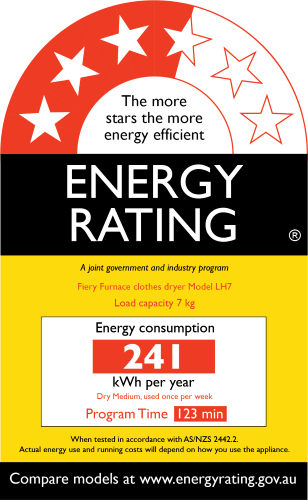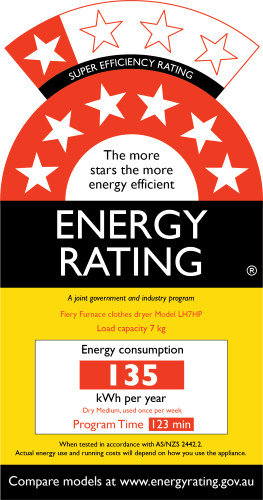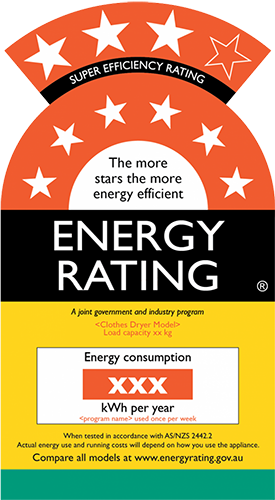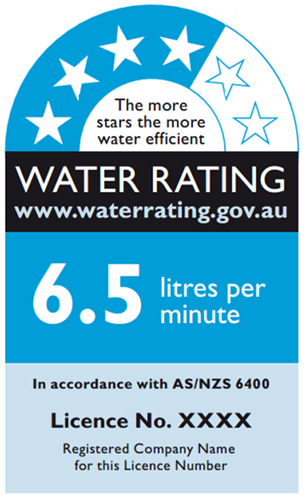For Consumers
Clothes dryers

Clothes dryers
Clothes dryers are a great convenience, shrinking the time it takes to complete a full laundry cycle. However, they consume a great deal of energy, adding to household bills and emissions. That is why choosing a dryer carefully, and using it wisely, is important for households looking to reduce their costs and carbon footprint.
Household clothes dryers must:
- comply with Minimum Energy Performance Standards.
- display an Energy Rating Label when sold in-store.
The Energy Rating Label
The more stars, the more savings.
The Energy Rating Label helps you make an informed choice when buying a clothes dryer. It provides 3 important pieces of information about the appliance:
- star rating
- estimated annual energy consumption
- ‘Program Time’.
The star rating shows the energy efficiency of an appliance. It allows you to compare the efficiency of products that have similar capacity and features. The more stars, the less energy it uses and the cheaper it is to run.
The energy consumption tells you the estimated amount of electricity the appliance can use in a year. This number helps you predict the running costs.
The ‘Program Time’ relates to the program used to test the model’s energy performance. It is the time, in minutes, the clothes dryer takes to complete that program cycle.
It must also display the:
- brand
- model of clothes dryer
- load capacity, which is the amount of damp clothes you can place in the drum in kilograms
- program name, which is the program specified to calculate the estimated annual energy consumption. It is assumed that clothes dryers are used once a week.
Washer dryer combinations (combos) will display two Energy Rating Labels, one for the washing and one for the drying function.
Know your labels
This is the new Energy Rating Label which is being phased in from 4 October 2024. This label is used on models that have a 6-star (or below) rating.

The new super-efficient Energy Rating Label is being phased in from 4 October 2024. This is used for models that meet or beat a 7-star rating.

You may see an older Energy Rating Label on some appliances up to 3 October 2030 when they will be phased out.

How to choose the right clothes dryer for you
-
Start with the size of the drum or capacity
When purchasing a clothes dryer, the first step is to determine the size that meets your needs.
Capacity is key when choosing a clothes dryer. This is measured in kilograms and represents the amount of damp clothes it can hold.
To find out the right capacity for you, stand on your bathroom scales and record the weight. Then pick up a full basket of laundry, stand on the scales again and check the difference. Or check the capacity of your current dryer.
Remember buying bigger is not always better. Larger machines usually use more electricity, which means they will cost you more money in the long run.
-
Choose the type of dryer
Pros and cons of different types of dryers.
There are 5 main types available on the market.
- Vented dryers —they pump hot, humid air into the surrounding space, and need to be vented to the outdoors, otherwise the walls end up wet. The National Construction Code requires that where venting clothes dryers are installed, they must have a shaft or duct to outside air. These are the simplest and cheapest types of dryers to buy, but they are expensive to run. They are best suited to people who only use dryers for emergencies.
- Condenser dryers — these take moisture from the clothing and collect or drain it away. These appliances help reduce household water use. The water, once cooled, can be used around the home, for example to water plants. They are usually larger and quieter than vented machines but are more expensive and heavier. While they have a longer cycle time, they are gentler on clothes.
- Heat pump condenser dryers —They draw moisture from the clothing as well as recycle the hot air. They don't require venting to the outdoors, either capturing condensed water in a removable container or draining it away if the dryer is plumbed in. These are more expensive to buy but use much less energy.
- Washer dryer combinations (combos) – these appliances wash your clothes then dry them. You should consider the washing capability that may be comparable with front load washers but may use more water. While the dryer capability may be comparable with a condenser or vented dryer, it may take twice as long to dry your clothes. See Clothes washers for more information.
- Gas clothes dryers — these dryers don’t use electricity but instead use natural gas as a heat source. They have a higher purchase price, and you may need to make modifications to your laundry to have one installed.
-
Consider the physical size of the clothes dryer
Make sure you always measure the cavity or the physical space that you have for a new appliance. It could save you the hassle of cancelling your purchase or needing to return an item after it has been delivered.
-
Use the star rating to compare energy efficiency
It is important to compare products of the same capacity.
You can use the star ratings on the Energy Rating Label to compare the energy efficiency of similar sized appliances.
The star rating considers the capacity of the appliance, for example, a 10kg clothes dryer with a 5-star energy rating will use more energy than a 6kg clothes dryer with a 5-star rating.
Water Rating Label
Washer dryer combinations (combos) must display a Water Rating Label, under the Water Efficiency Labelling and Standards scheme.
The scheme was established in 2005 to encourage more efficient domestic water use and reduce demand for drinking water in Australia by informing consumers about water efficiency. It regulates taps, showers, toilets, urinals, flow controllers, dishwashers and washing machines.
Visit the Water Rating Label site for more information
Tips for using your clothes dryer
-
Save energy and money while drying your clothes
Clothes dryers can use a lot of energy. You can save this energy and the money it costs you by using a clothesline or hoist.
Drying clothes outside is the best option but using a drying rack in a warm ventilated spot inside your home is better than using a clothes dryer.
Fact: an efficient heat pump dryer uses 60% less energy than a conventional dryer.
Always remember clothes dryers are more efficient when fully loaded. Follow the advice below to save energy and money:
- Maximise your loads. Most dryers use the same amount of electricity doing a partial load as a full load, so make each load count.
- Minimise wet clothes going straight to the dryer. Try to air-dry clothes first. You can then save energy by using a cooler temperature program to complete clothes drying. If you must dry clothes straight from the washing machine, make sure the load has been on a high spin cycle.
- Clean the filter after each load. Blocked lint filters reduce the air circulation around the clothes, making your dryer work harder and use more energy. They also create a fire hazard.
- Ventilate the space. Venting dryers expel heat and moisture into the space around it, making it more difficult for the dryer to do its job. Open a window or use your home ducting to expel the heat and moisture allowing your venting dryer to work more efficiently.
Additional resources

Visit Your Home which provides information on designing new homes and home improvements. There is a dedicated Appliances and technology section providing information about clothes dryers and other appliances.

